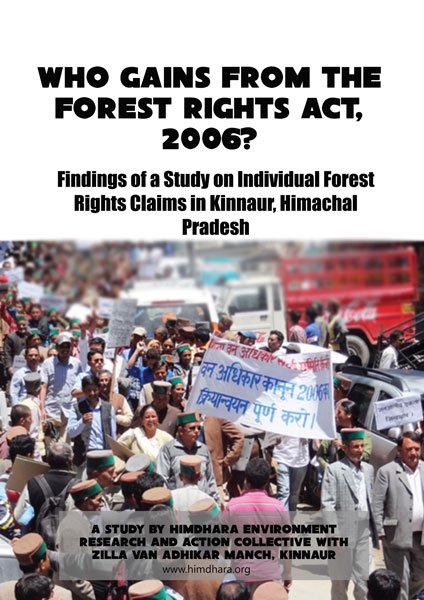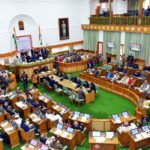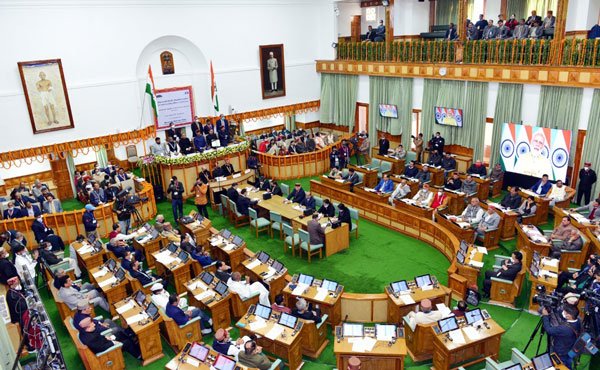
Old photo. Used for indicative purpose only. Source Himdhara brochure
Shimla, Apr 14,
A coalition of environmental and social organisations, along with forest rights activists, has raised serious concerns over a letter issued by the Principal Chief Conservator of Forests (PCCF) regarding the implementation of the Forest Rights Act (FRA), 2006. Calling the letter “unnecessary, misleading, and contrary to the spirit of the Act,” the groups have demanded its immediate withdrawal, accusing the Forest Department of attempting to obstruct the law’s already delayed implementation in the state.
The communication from the PCCF raises objections to the recognition of forest rights under the FRA, citing potential forest degradation and ecological imbalance. Activists argue that this stance contradicts the very foundation of the law, which empowers local communities to sustainably manage, protect, and conserve forests while ensuring their livelihood and tenurial security.
The timing of the letter has also raised eyebrows. It comes even as the state government, led by Tribal Development Minister Jagat Singh Negi, has shown renewed commitment to enforcing the FRA. Minister Negi has recently conducted several interactive training sessions with district officials across the state to expedite implementation efforts that have been pending for over 17 years.
As Himachal Pradesh marks its statehood day, the letter, which raises alarm over the recognition of tenurial rights of forest-dependent communities, has been described as reflecting a “colonial mindset” by organisations including Himdhara Collective, Himlok Jagrati Manch, Himalaya Niti Abhiyan, and others. They argue that the PCCF’s communication undermines the authority of the Ministry of Tribal Affairs and the State Level Monitoring Committee, the designated bodies to issue clarifications on FRA.
Activists pointed out that the FRA provides a well-defined, multi-tiered and democratic framework for verifying and recognizing rights, and the Forest Department’s unilateral interpretation misrepresents key provisions.
They noted that the letter revives old, resolved issues and introduces new myths—particularly around the eligibility of Other Traditional Forest Dwellers (OTFDs), the constitution of Gram Sabhas, the use of technology in claim verification, and commercial land use such as apple orchards.
According to the activists, the Forest Department’s attempt to reinterpret the term OTFD effectively bypasses the definition provided under Section 2(o) of the Act. While Scheduled Tribes are automatically eligible, OTFDs—such as Scheduled Caste and other marginalized communities—only need to prove residence and dependence on forest land for three generations before the cut-off date of December 13, 2005. Beyond that, their rights and entitlements are identical. The suggestion that the inclusion of OTFDs poses a threat due to their numbers is seen as a deliberate effort to deny legitimate claims of a large section of the state’s population.
On the issue of Gram Sabhas, the Forest Department’s insistence on aligning them with Panchayat-level structures, rather than the habitation or village level as mandated under the FRA, is viewed as a violation of the law. This matter had already been conclusively resolved in the SLMC meeting held in 2013, and reaffirmed in an affidavit submitted by the Chief Secretary of Himachal Pradesh before the Supreme Court in 2016, which acknowledged the legal requirement for forming Forest Rights Committees at the village level.
The PCCF’s letter also recommends the mandatory use of satellite imagery and video recordings during claim verification. Activists point out that the FRA Rules do not require such technological evidence and that oral testimonies and traditional knowledge are equally valid under Rule 13. In fact, a 2013 Gujarat High Court ruling struck down a similar directive mandating satellite imagery as the primary basis for decisions.
Another flashpoint is the dismissal of claims related to apple orchards. The activists argue that apple cultivation falls squarely within the definition of self-cultivation for livelihood purposes under Section 3(1)(a) of the FRA and Rule 12A(8), which also includes allied livelihood activities like keeping cattle and growing tree crops. They warn that blanket rejections of such claims not only undermine the law but also endanger the livelihoods of thousands of forest-dependent farming families in Himachal Pradesh.
They also contested the Forest Department’s suggestion that FRA implementation could harm forests, stating that the Act empowers local communities as custodians of forests and biodiversity. Citing past misuse of templates and misleading references to Supreme Court rulings, activists accused the Forest Department of repeated attempts to derail FRA implementation.
In a joint submission to the Ministry of Tribal Affairs and state authorities, over 20 organisations from across Himachal Pradesh urged the government to initiate dialogue with the forest bureaucracy to address concerns and rebuild trust. They reiterated that in many parts of the state, it is forest rights holders who have played a leading role in conservation, and will continue to do so more effectively if their tenures are legally recognised.
“The strength of Himachal’s forests lies in its people. Recognising their rights is not a threat to the environment—it is the surest way to protect it,” the statement said.

The HimachalScape Bureau comprises seasoned journalists from Himachal Pradesh with over 25 years of experience in leading media conglomerates such as The Times of India and United News of India. Known for their in-depth regional insights, the team brings credible, research-driven, and balanced reportage on Himachal’s socio-political and developmental landscape.













1 thought on “Forest Rights stir on Himachal Day: Activists slam PCCF letter, call for withdrawal”